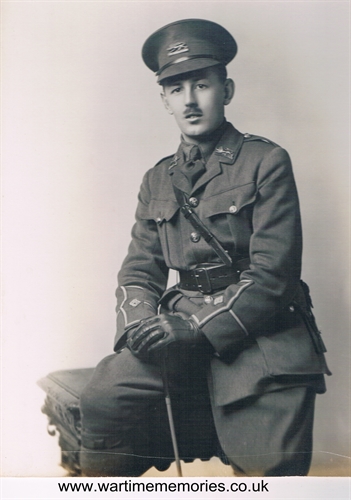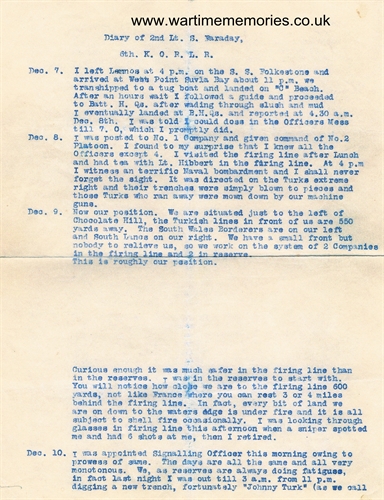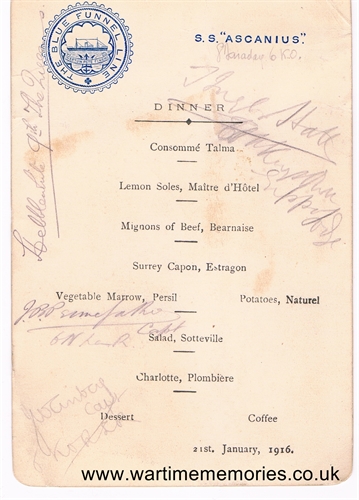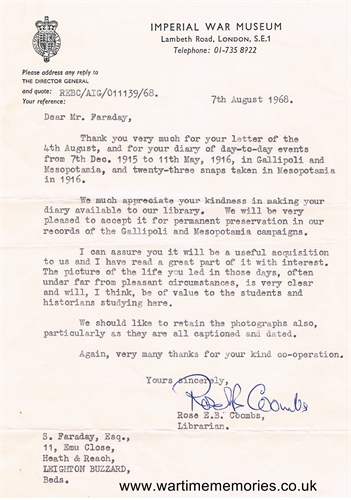Additions will be checked before being published on the website and where possible will be forwarded to the person who submitted the original entries. Your contact details will not be forwarded, but they can send a reply via this messaging system.
please scroll down to send a message
2nd Lt. Sidney Faraday
British Army 6th Btn. Kings Own Royal Lancaster Regiment
A relative, who deals in antiques, recently came upon several articles and a photograph of a man who had served in both the 1st and 2nd World wars, which were for sale at an auction, along with other items.
2nd Lieutenant Sidney Faraday of the 6th Battalion, Kings Own Royal Lancaster Regiment served at Gallipoli and Mesopatamia between December 1915 and May 1916 and, during the course of this time, he kept a record of his activities and feelings. This record consists of 16 typewritten pages so it will be impractical to copy it all but I will attempt to summarise.
He left England on 17th November 1915 and sailed to Lemnos, a Greek Island. At 4.00pm on 7th December he left Lemnos, on the SS Folkestone, arriving at West Point, Sulva Bay at about 11.00 pm. He was posted to No.1 Company and given command of No.2 Platoon. He describes their position as ‘to the left of Chocolate Hill’ with the Turkish lines about 550 yards away. He describes how it appears to be safer in the firing line than it does in reserve because the rest area is so close to enemy lines and shelling. However, he then goes on to say (9th December) how he was looking through glasses and spotted a sniper, who had 6 shots at him but failed to hit him. On December 11th he describes being showered with ‘whizz bangs’, a shell that comes at you very quickly and has burst before you know it. On this date a piece of shrapnel missed him by less than a foot.
He describes being ordered to carry out a reconnoitring patrol with 2nd Lieutenant Openshaw and eight other men. They advanced to within 150 yards of the Turkish trenches when they noticed Turks both sides of them. They had been spotted. They hurled 6 bombs into the Turks and ‘what yells they gave, we must have laid a few of them out’. They were fired upon by the Turks but laid on their stomachs and all managed to retire safely.
On December 13th, orders were received for the evacuation, and preparations were commenced. His Battalion actually left at 5.45pm on 18th December on SS Rowan and sailed for Mudros, enjoying a good night's sleep on board.
They then camped in Portianos Camp, West Mudros until January 19th. Most of the entries for that period describe the weather and fatigue duties although an entry on 11th January declares ‘Thomas Hall made a great discovery, namely a wet canteen. He was carried shoulder high and became the hero of the day’.
They left Mudros on 19th January and, after stops at Port Said and Alexandria, reached Basrah on 27th February. Amongst the paperwork included with this record was a Dinner menu, dated 21st January 1916, which is signed, back and front, presumably by the officers present at the meal. I have attached a picture of the menu.
They travelled up river from Basrah and eventually reached a camp. They did not sleep well due to the noises of dogs, jackals, hyenas and frogs. Following this they carried on eventually reaching their final destination which was a ‘rough camp, 5 or 6 miles behind the firing line’. He expresses concern that the terrain is so flat that there is no cover.
On 2nd April they moved up to the trenches and he describes the planning for an attack to relieve General Townsend at Kut Al Amara which was under siege. The attack took place on 5th April. He took part in the initial attack at 4.55am following a period of bombardment by artillery. The attack was successful and they advanced about 6 miles before being relieved at 1.30am on 6th. They bivouacked on the banks of the Tigris about 12 miles from Kut Al Amara. Over the next few days he describes several more experiences including, along with 7 other men, having to dash across 110 yards with signalling equipment during which 2 men were badly wounded and 2 were slightly wounded. He also states that they had started this campaign with 18 officers of which only 8 remained. 3 were killed, 3 wounded and 4 missing. He classes himself as extremely lucky.
They remained in and out of the action until 27th April. He describes several instances including a boat full of supplies attempting to get up the Tigris to supply Kut Al Amara. He also mentions the way one must eat food, by holding it in ones left hand, about 1 inch from the mouth, and then brushing the flies off with the right hand before eating. On 29th April, news was received of Townsend's surrender and he expresses concern about what will become of them.
On 3rd May, he describes an unofficial armistice when both sides searched for, and buried, their dead. He strolled about and met a Turkish Officer. They shook hands and the officer offered him a cigarette. They talked, in French, and the officer ‘seemed a jolly decent man and a thorough good sportsman’. Both British and Turkish soldiers then stripped off and swam and bathed in the river. At 3.00pm the unofficial armistice ended and ‘needless to say, Brigade HQs were very wrathful when they heard’.
They were relieved and left the area on 8th May which is where the diary entries end.
During the course of this period of time, 2nd Lieutenant Faraday took a series of photographs which, in 1968, he deposited with the Imperial War Museum where they still remain. Two of them are viewable on line.



